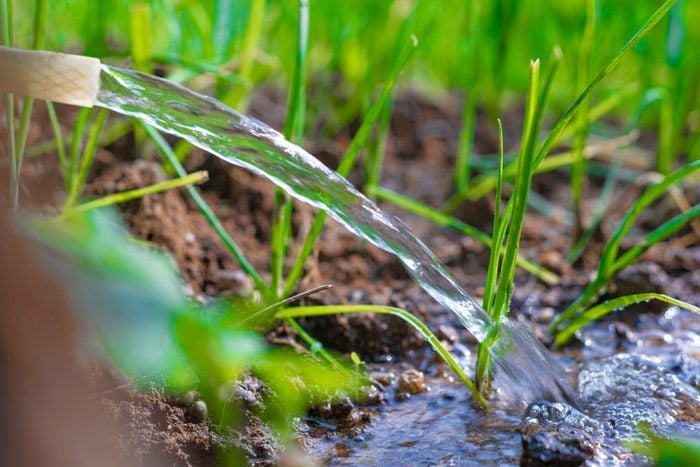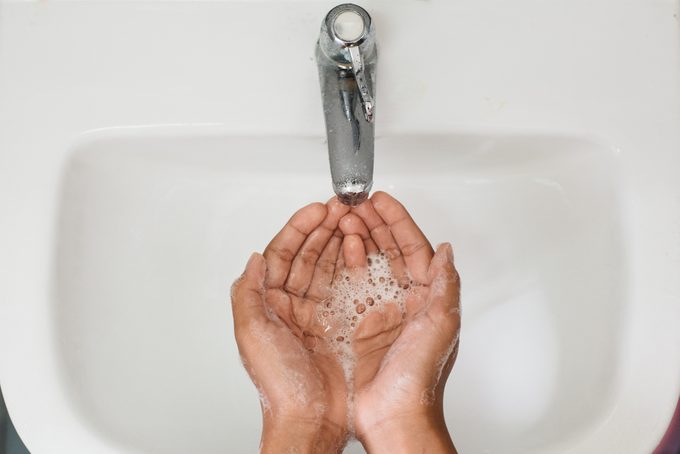What To Know About Grey Water

Conserve water and save money while helping your landscaping thrive. Here's what to know about grey water systems.
My first house was a cabin in the mountains with a septic tank so old I constantly worried about it failing. So I installed a grey water system with the hopes of prolonging its life.
It worked. And if I had trees, bushes and flowers to water, it would have been twice as useful. Plant watering is the main reason why more homeowners are looking into installing grey water systems.
“What a waste it is to flush toilets with such a precious resource as clean drinking water,” says Lauren Anderson, academy director at Earthship Biotecture in New Mexico.
Earthship’s headquarters, in the desert, only gets around seven inches of rain a year. But all the houses in that neighborhood have such sophisticated rain capture and grey water systems that residents grow their own produce and rarely need supplemental water from wells.
For those of us in standard houses, installing a grey water system can still make a big difference. Households can reuse around two-thirds of their indoor water on outdoor irrigation. Considering outdoor use makes up between 30% and 70% of our water bills, that can save money, plus upwards of 40,000 gallons of water a year.
On This Page
What Is Grey Water?
Grey water is wastewater from showers, baths, washing machines and bathroom sinks. It should not be confused with black water, aka wastewater from the toilet. Some states consider water from kitchen sinks and dishwashers to be black water, while others don’t.
Regardless of where you live, kitchen water contains higher levels of grease and organic material than other sources of grey water.
What Can You Use Grey Water For?
Grey water is most commonly used for outdoor irrigation.
“Simple systems take unfiltered grey water and distribute it to larger plants, like trees and bushes,” says Laura Allen, the cofounder of Greywater Action. Her group teaches people how to design and install grey water irrigation systems.
Other types of systems filter the water so it can be distributed by a special drip irrigation system. More complex systems can filter the water to flush toilets.
Is Grey Water Dangerous?
No. With basic health and safety precautions, grey water is safe to use.
Because it could carry bacteria and viruses and chemicals left over from your laundry, you should never drink it, or allow anyone to touch it. Don’t use it on root vegetables, and don’t let it touch the edible portion of any food plant. It should also never be sprayed or allowed to pool up, run off the property or run too close to a waterway.
What Is a Grey Water System?
One that allows you to direct grey water to the landscape or toilet for reuse, back to a septic tank, or down the city water drain.
Some grey water systems rely on gravity to move the water outside. Others employ a small tank with a pump inside to push water uphill or across a flat landscape. Many systems use a natural mulch filter in the landscape to catch hair and debris before the water soaks into the soil. Others feature an external filter you must clean by hand.
“The system is a pass through,” says Remy Sabiani, owner of Water Wise Group. “You’re going to take a shower and pretty much at the same time you’re going to water your plants. You’re going to do a load of laundry, and pretty much at the same time you’re going to water your plants.”
The best way to save water with this system? “Figure out how much grey water your home produces,” says Allen. “Then, determine how much water your plants need so you can properly irrigate them.”
Can You DIY a Grey Water System?
Yes. If you have basic plumbing and landscaping skills, you can install a simple “laundry-to-landscape” type system. This taps into water directly from the washing machine and without altering the plumbing of your home. The materials cost around $300.
Some water agencies offer incentives to offset the cost for this system. Other systems warrant more plumbing skills, and some require a professional installer.
Also, you’ll need to research state, county and city regulations, because the legality of grey water systems varies. It often depends on the type of system, where it’s installed (home or business) and the volume of water that passes through it.
Also, keep in mind you’re typically not allowed to store grey water for more than 24 hours. You should avoid products high in salt or containing Boron. Organizations like Greywater Action provide info on what soaps are safe for your plants and how to install a grey water system.




